Thousands of rioting Serbian football hooligans have left 14 people injured. And the Euro 2012 qualifier between Serbia and Italy in Genoa was abandoned.
The match was abandoned at 0-0 by the Scottish referee after just six minutes after Serbian thugs threw flares onto the pitch and at Italian fans.
Just before the start of the match, Italian fans booed the Serbian national anthem. A minute's applause was also supposed to take place in honour of four Italian soldiers who have been killed in Afghanistan, but the applause didn't last that long due to crowd trouble.
Violence then followed the abandonment, which left an Italian cop seriously injured after a flare blew up in his face. Many Serbian fans made Nazi salutes, and some even burned Albania flags - Serbia has a border dispute with Albania.
Clashes continued for hours after the match was abandoned and Tomislav Karadzic, the president of the Serbia football federation, said the protest was likely organized back in Belgrade. 'It's an attack on the state and the state has to resolve this problem,' he was quoted as saying by Serbian media.
And Italy security director Roberto Massucci was upset that the Serbian police didn't warn of the danger from their fans.
UEFA could now award Italy a 3-0 victory by default. The same thing happened in 2007 when Sweden were awarded a 3-0 victory over Scandinavian rivals Denmark following their abandoned Euro 2008 qualifier.
Italian fans themselves are notorious for their hooliganism and racism when it comes to black players. But last night it was mainly the Serbian fans who were to blame.
Serbia has only been an independent nation since 2006 when it and Montenegro split apart. Their state was known as the Federal Republic of Yugoslavia from 1992 until 2003, when it became known as Serbia and Montenegro. The country was bombed by NATO in 1999.
FIFA consider the Serbia football team to be a direct descendant of the Serbia and Montenegro team and the Montenegro football team to be an entirely new team. Montenegro (the world's youngest footballing nation) played England (the world's oldest) last night.
Thousands of rioting Serbian fans attack Italian police, forcing referee to abandon Euro football match
By Daily Mail Reporter
13th October 2010
Daily Mail
Fourteen people were injured after Serbian football fans clashed with riot police following the aborted European Championship qualifier between Italy and Serbia last night.
The most seriously injured was a member of Italy's caribinieri, who was rushed to hospital after after a flare exploded in his face. A Serbian fan also suffered facial injuries.
The match was abandoned after just six minutes when Serbian fans threw flares on to the pitch and at rival Italy supporters.
Supporters also clashed with police earlier in the day and delayed the start of the match for 45 minutes.
Enlarge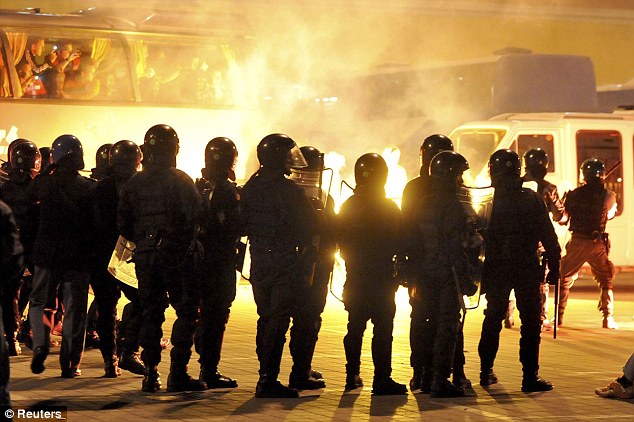
Police officers stand outside the Luigi Ferraris stadium during a clash with Serb supporters
Enlarge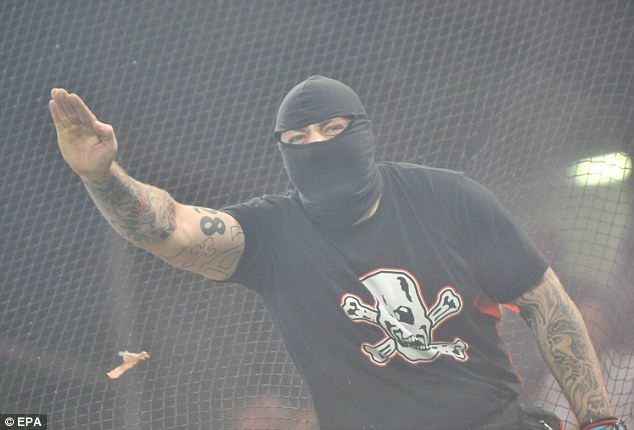
Nazi salute: A masked Serbian hooligan climbs on to a plexiglass security barrier and gestures at riot police
When the game finally began, more flares and fireworks were thrown on to the field and Scottish referee Craig Thomson stopped the match at 0-0.
Italy could now be awarded a 3-0 victory by default.
'The referee felt that the players' security couldn't be assured. Now it's up to UEFA and their disciplinary procedures,' Italian football federation general secretary Antonello Valentini said.
Uefa spokesman Rob Faulkner said that when a match is abandonned for safety reasons the normal procedure is to use the referee and match delegate's report to open a case before its control and disciplinary panel.
In 2007, the panel awarded Sweden a 3-0 default win over Denmark in a similar case.
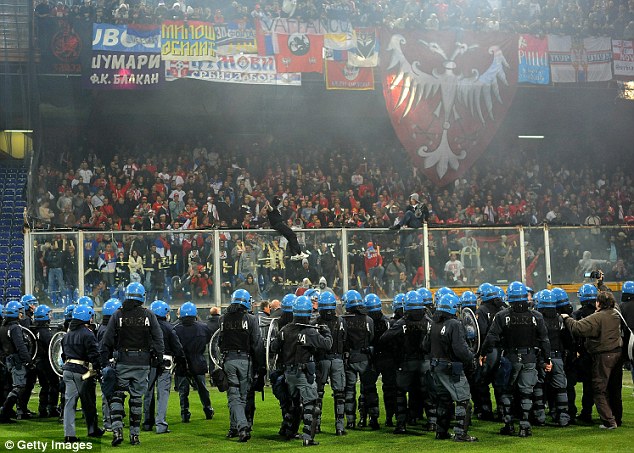
Police in riot gear confront Serbia fans during the qualifier between Italy and Serbia at Luigi Ferraris Stadium
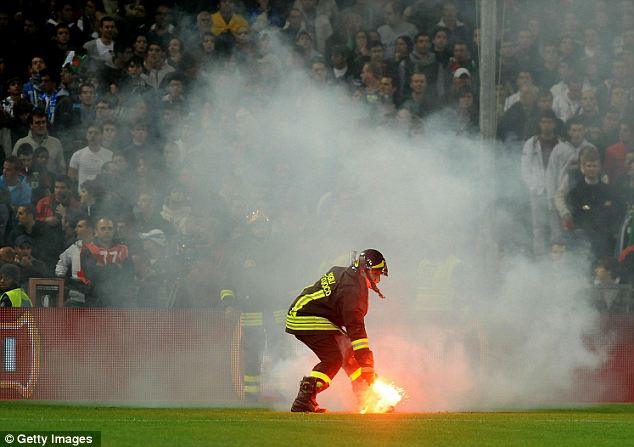
A fireman removes a flare from the pitch thrown by Serbian fans
Enlarge
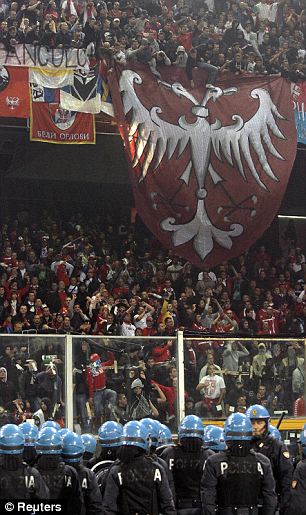
Supporters hold a metal object which they later use to try to break the glass. Police officers stand in front of the tribune of Serbia's supporters
Clashes continued for hours outside the Luigi Ferraris stadium in Genoa after the match was called off.
Tomislav Karadzic, the president of the Serbia football federation, said the protest was likely organized back in Belgrade.
'It's an attack on the state and the state has to resolve this problem,' he was quoted as saying by Serbian media.
Italy security director Roberto Massucci was upset that the Serbian police didn't warn of the danger from their fans.
'Fans this dangerous shouldn't have arrived in Genoa,' Massucci said. 'Due to experience we were prepared but we never imagined such a high level of aggressiveness.'
Italy goalkeeper Emiliano Viviano said it would have been impossible to play in the goal in front of the Serbia fans.
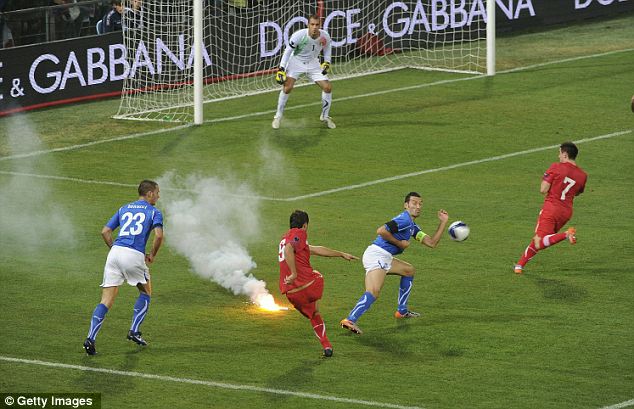
Dragan Mrdja of Serbia competes with Gianluca Zambrotta of Italy next to a flare thrown on to the pitch

Before the scheduled kickoff, a few fans with their heads covered climbed up onto a partition, took out tools and began cutting through a mesh fence
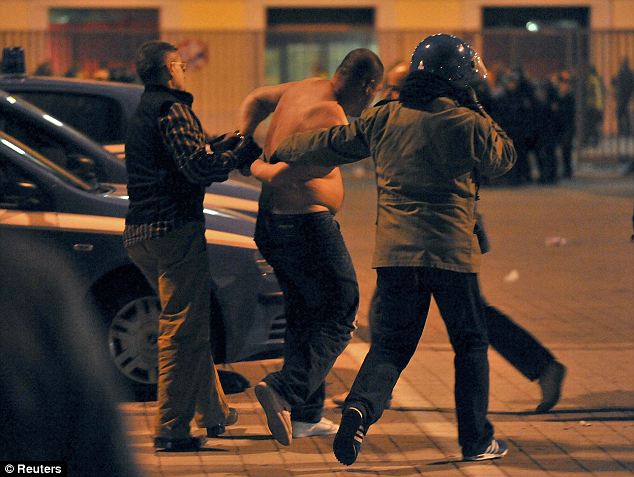
A Serb supporter is arrested by police officers during a clash outside the Luigi Ferraris stadium after the match was suspended
'I would have had to constantly turn around to avoid the fireworks,' he said. 'It wouldn't have been nice to get hit in the head.'
Serbia has faced increased criticism at home after losing 3-1 at home to Estonia on Friday.
That match marked the debut of new coach Vladimir Petrovic, who was called in when Radomir Antic was fired following a 1-1 draw at home with Slovenia last month, which only added to a crisis that began with a disappointing first-round exit from the World Cup.
SERBIAN FOOTBALL THUGS HAVE PREVIOUS - THEY EVEN STARTED A WAR
The rivalry between the nations that make up the United Kingdom - particularly England and Scotland - may be seen as fierce, but no football match in the UK has ever started a war. The worse that usually happens is that Scottish thugs trash the Wembley goalposts on the rare occasions their team is victorious there. But a football match starting a war is precisely what happened in Yugoslavia in the early 1990s when a Serbian and Croatian team clashed (it's also a good example of how football is such a powerful force throughout Europe).
At the time, Serbian football hooligans were probably the most powerful in the world, seizing control not only of football but also the criminal underworld, and Serbian hooligan gangs committed some of the worst atrocities of the war.
On 13th May 1990, Dinamo Zagreb (of Croatia) and Red Star Belgrade (of Serbia) met each other in a Yugoslavian league match. The match caused a mass riot which is still viewed to this day as the start of Croatia's war of independence from Serbia.
Both teams had significant ultra followings, with Red Star’s gang, led by the warlord Arkan, named the "Delije" and Dinamo’s group going by the name of Bad Blue Boys. In the war that was to follow a year later, these groups would make up the core of the two armies serving on the front line and both came to the game prepared, with the Croats of Zagreb bringing rocks and their Serbian opponents coming with acid to burn through security fences.
The build-up to the game saw numerous clashes between fans and as the game began the 3,000-strong Delije tried to provoke the home crowd, with chants such as ‘Zagreb is Serbian’ and ‘We’ll kill Tudjman.’
As the BBB began to simmer, the Delije tore up seats, threw them at home fans and began to charge at fans. The Yugoslav police made no attempts to stop them and a mass brawl soon broke out.
The fight spilled out onto the pitch and would rage for seventy minutes. Red Star players immediately returned to the dressing room and were removed from the stadium by helicopter, but many of the ultra-loyal and politicised Dinamo players stayed on the pitch.
The stage was set for the most iconic moment of the day, when Dinamo’s 21-year old captain Zvonimir Boban saw one of his side’s fans being attacked by a police officer and launched a Cantona-esque karate kick at him, knocking the officer down allowing the fan to get away. With an ad-hoc team of BBB bodyguards Boban retreated, becoming a national hero in the process. He would later say of the incident: “Here I was, a public face prepared to risk his life, career and everything that fame could have brought, all because of one ideal cause; the Croatian cause.”
The Yugoslavian FA suspended Boban for 6 months, meaning he would miss the 1990 World Cup, as he was vilified across Serbia. In 1991 he signed for AC Milan, enjoying great success in his nine seasons at the San Siro, during which time he would captain the newly independent Croatian national side to third place in the 1998 World Cup.
The Yugoslavian league would last for one more year, but when fighting and civil war gripped the region Yugoslavian football disintegrated, but not before Red Star Belgrade won the European Cup in 1991, weeks before the Croatian War of Independence broke out.
A statue of a group of soldiers stands in front of the Maksimir ground, with a plaque reading: ‘To the fans of the club, who started the war with Serbia at this ground on May 13, 1990.” Although it is an exaggeration to claim that this is true, it was certainly a litmus test of political and ethnic feelings in the region at the time and goes to prove that football is more than simply a game for many.
At this time, going to a football match was often a very dangerous experience. In England alone, 96 Liverpool fans were crushed to death during the Hillsborough disaster in Sheffield on 15th April 1989 and 56 fans were killed when a fire engulfed a stand at the Valley Parade stadium in Bradford during a league match between Bradford City and Lincoln City on 11th May 1985.
Before the scheduled kickoff, a few fans with their heads covered climbed up onto a partition, took out tools and began cutting through a mesh fence.
Plexiglass partitions were also broken, while another fan burned what appeared to be an Albanian flag.
Enlarge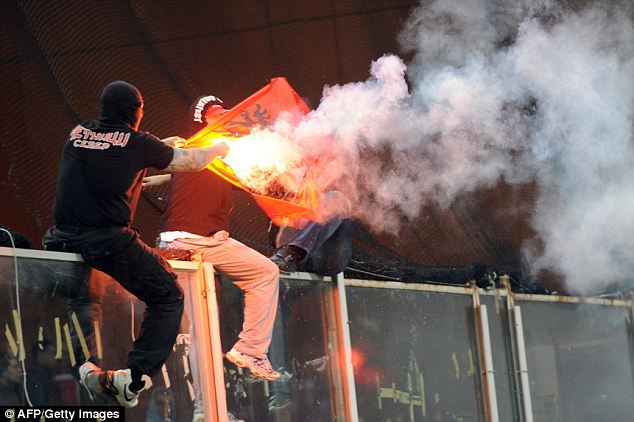
Serbian supporters burn an Albanian flag before the European 2012 qualifyng football match between Italy and Serbia
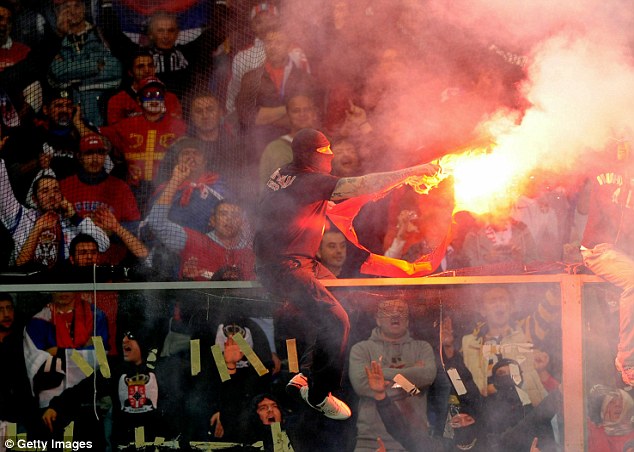
Earlier in the day, Serbia's first-choice goalkeeper, Vladimir Stojkovic, was hit by a flare thrown toward the team bus and taken to a local hospital
The players retreated to the dressing rooms while police dressed in riot gear confronted the fans, but even when the teams returned, the trouble in the stands continued, and Serbia's fans whistled and booed throughout their national anthem.
Earlier in the day, Serbia's first-choice goalkeeper, Vladimir Stojkovic, was hit by a flare thrown toward the team bus and taken to a local hospital.
Stojkovic upset some Red Star Belgrade fans by moving to the club's fierce rival Partizan in the offseason.
When the game started, Stojkovic's replacement, Zeljko Brkic, was nearly hit by one of the flares thrown onto the pitch.
Italy coach Cesare Prandelli said he found Stojkovic trembling in the Azzurri changing room when his squad reached the stadium.
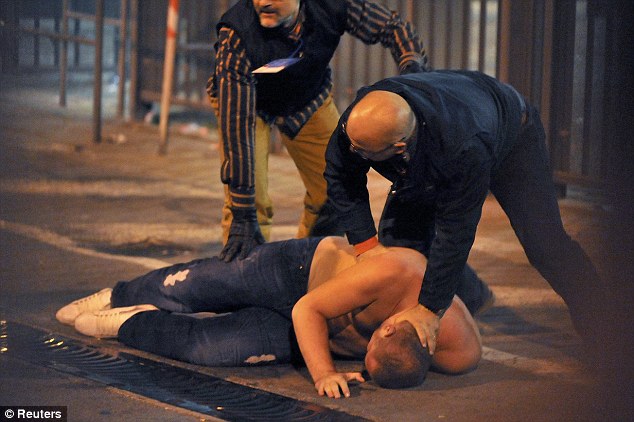
A supporter is arrested by police officers during a clash outside the Luigi Ferraris stadium
Enlarge
A supporter of Serbia's football team tries to break the glass of the tribune during the team's Euro 2012 qualifying match
Enlarge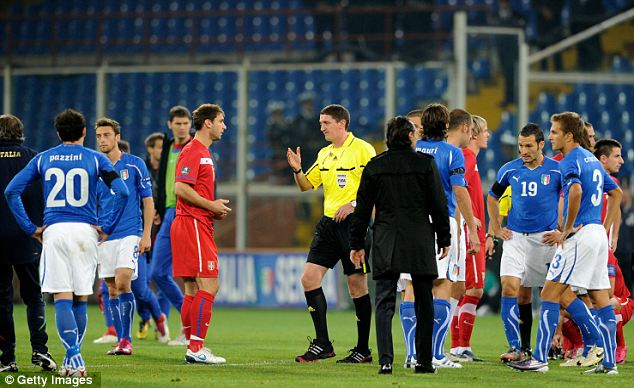
Scottish referee Craig Thompson (C) suspends the match whebn fans refuse to stop throwing flares
'We couldn't understand why, then the interpreter explained it to us,' Prandelli said.
'He was threatened and feared for his safety. Right then and there we realised that the game was at risk. Every (Serb) player knew that their fans were organized to suspend the game.'
Italy midfielder Angelo Palombo said: 'This isn't football, it's pure delinquency.'
He added that Serbia captain Dejan Stankovic came into the Azzurri's changing room to apologise after the game was abandoned.
At one point during the delay, the Serbia squad walked over and appeared to applaud their fans ironically and ask them to calm down.
'We didn't applaud, we calmed down the fans,' Stankovic said.
The match was meant to be played in memory of four Italian soldiers killed in Afghanistan on Saturday.
Several fan banners around the stadium paid tribute to the soldiers and Italy wore black armbands.
'It's a real big disappointment, because there were a lot of kids in the stadium with their families ready to watch a great game,' Prandelli said.
dailymail.co.uk
www.onthisfootballday.com
The match was abandoned at 0-0 by the Scottish referee after just six minutes after Serbian thugs threw flares onto the pitch and at Italian fans.
Just before the start of the match, Italian fans booed the Serbian national anthem. A minute's applause was also supposed to take place in honour of four Italian soldiers who have been killed in Afghanistan, but the applause didn't last that long due to crowd trouble.
Violence then followed the abandonment, which left an Italian cop seriously injured after a flare blew up in his face. Many Serbian fans made Nazi salutes, and some even burned Albania flags - Serbia has a border dispute with Albania.
Clashes continued for hours after the match was abandoned and Tomislav Karadzic, the president of the Serbia football federation, said the protest was likely organized back in Belgrade. 'It's an attack on the state and the state has to resolve this problem,' he was quoted as saying by Serbian media.
And Italy security director Roberto Massucci was upset that the Serbian police didn't warn of the danger from their fans.
UEFA could now award Italy a 3-0 victory by default. The same thing happened in 2007 when Sweden were awarded a 3-0 victory over Scandinavian rivals Denmark following their abandoned Euro 2008 qualifier.
Italian fans themselves are notorious for their hooliganism and racism when it comes to black players. But last night it was mainly the Serbian fans who were to blame.
Serbia has only been an independent nation since 2006 when it and Montenegro split apart. Their state was known as the Federal Republic of Yugoslavia from 1992 until 2003, when it became known as Serbia and Montenegro. The country was bombed by NATO in 1999.
FIFA consider the Serbia football team to be a direct descendant of the Serbia and Montenegro team and the Montenegro football team to be an entirely new team. Montenegro (the world's youngest footballing nation) played England (the world's oldest) last night.
Thousands of rioting Serbian fans attack Italian police, forcing referee to abandon Euro football match
By Daily Mail Reporter
13th October 2010
Daily Mail
Fourteen people were injured after Serbian football fans clashed with riot police following the aborted European Championship qualifier between Italy and Serbia last night.
The most seriously injured was a member of Italy's caribinieri, who was rushed to hospital after after a flare exploded in his face. A Serbian fan also suffered facial injuries.
The match was abandoned after just six minutes when Serbian fans threw flares on to the pitch and at rival Italy supporters.
Supporters also clashed with police earlier in the day and delayed the start of the match for 45 minutes.
Enlarge

Police officers stand outside the Luigi Ferraris stadium during a clash with Serb supporters
Enlarge

Nazi salute: A masked Serbian hooligan climbs on to a plexiglass security barrier and gestures at riot police
When the game finally began, more flares and fireworks were thrown on to the field and Scottish referee Craig Thomson stopped the match at 0-0.
Italy could now be awarded a 3-0 victory by default.
'The referee felt that the players' security couldn't be assured. Now it's up to UEFA and their disciplinary procedures,' Italian football federation general secretary Antonello Valentini said.
Uefa spokesman Rob Faulkner said that when a match is abandonned for safety reasons the normal procedure is to use the referee and match delegate's report to open a case before its control and disciplinary panel.
In 2007, the panel awarded Sweden a 3-0 default win over Denmark in a similar case.

Police in riot gear confront Serbia fans during the qualifier between Italy and Serbia at Luigi Ferraris Stadium

A fireman removes a flare from the pitch thrown by Serbian fans
Enlarge


Supporters hold a metal object which they later use to try to break the glass. Police officers stand in front of the tribune of Serbia's supporters
Clashes continued for hours outside the Luigi Ferraris stadium in Genoa after the match was called off.
Tomislav Karadzic, the president of the Serbia football federation, said the protest was likely organized back in Belgrade.
'It's an attack on the state and the state has to resolve this problem,' he was quoted as saying by Serbian media.
Italy security director Roberto Massucci was upset that the Serbian police didn't warn of the danger from their fans.
'Fans this dangerous shouldn't have arrived in Genoa,' Massucci said. 'Due to experience we were prepared but we never imagined such a high level of aggressiveness.'
Italy goalkeeper Emiliano Viviano said it would have been impossible to play in the goal in front of the Serbia fans.

Dragan Mrdja of Serbia competes with Gianluca Zambrotta of Italy next to a flare thrown on to the pitch

Before the scheduled kickoff, a few fans with their heads covered climbed up onto a partition, took out tools and began cutting through a mesh fence

A Serb supporter is arrested by police officers during a clash outside the Luigi Ferraris stadium after the match was suspended
'I would have had to constantly turn around to avoid the fireworks,' he said. 'It wouldn't have been nice to get hit in the head.'
Serbia has faced increased criticism at home after losing 3-1 at home to Estonia on Friday.
That match marked the debut of new coach Vladimir Petrovic, who was called in when Radomir Antic was fired following a 1-1 draw at home with Slovenia last month, which only added to a crisis that began with a disappointing first-round exit from the World Cup.
SERBIAN FOOTBALL THUGS HAVE PREVIOUS - THEY EVEN STARTED A WAR
The rivalry between the nations that make up the United Kingdom - particularly England and Scotland - may be seen as fierce, but no football match in the UK has ever started a war. The worse that usually happens is that Scottish thugs trash the Wembley goalposts on the rare occasions their team is victorious there. But a football match starting a war is precisely what happened in Yugoslavia in the early 1990s when a Serbian and Croatian team clashed (it's also a good example of how football is such a powerful force throughout Europe).
At the time, Serbian football hooligans were probably the most powerful in the world, seizing control not only of football but also the criminal underworld, and Serbian hooligan gangs committed some of the worst atrocities of the war.
On 13th May 1990, Dinamo Zagreb (of Croatia) and Red Star Belgrade (of Serbia) met each other in a Yugoslavian league match. The match caused a mass riot which is still viewed to this day as the start of Croatia's war of independence from Serbia.
Both teams had significant ultra followings, with Red Star’s gang, led by the warlord Arkan, named the "Delije" and Dinamo’s group going by the name of Bad Blue Boys. In the war that was to follow a year later, these groups would make up the core of the two armies serving on the front line and both came to the game prepared, with the Croats of Zagreb bringing rocks and their Serbian opponents coming with acid to burn through security fences.
The build-up to the game saw numerous clashes between fans and as the game began the 3,000-strong Delije tried to provoke the home crowd, with chants such as ‘Zagreb is Serbian’ and ‘We’ll kill Tudjman.’
As the BBB began to simmer, the Delije tore up seats, threw them at home fans and began to charge at fans. The Yugoslav police made no attempts to stop them and a mass brawl soon broke out.
The fight spilled out onto the pitch and would rage for seventy minutes. Red Star players immediately returned to the dressing room and were removed from the stadium by helicopter, but many of the ultra-loyal and politicised Dinamo players stayed on the pitch.
The stage was set for the most iconic moment of the day, when Dinamo’s 21-year old captain Zvonimir Boban saw one of his side’s fans being attacked by a police officer and launched a Cantona-esque karate kick at him, knocking the officer down allowing the fan to get away. With an ad-hoc team of BBB bodyguards Boban retreated, becoming a national hero in the process. He would later say of the incident: “Here I was, a public face prepared to risk his life, career and everything that fame could have brought, all because of one ideal cause; the Croatian cause.”
The Yugoslavian FA suspended Boban for 6 months, meaning he would miss the 1990 World Cup, as he was vilified across Serbia. In 1991 he signed for AC Milan, enjoying great success in his nine seasons at the San Siro, during which time he would captain the newly independent Croatian national side to third place in the 1998 World Cup.
The Yugoslavian league would last for one more year, but when fighting and civil war gripped the region Yugoslavian football disintegrated, but not before Red Star Belgrade won the European Cup in 1991, weeks before the Croatian War of Independence broke out.
A statue of a group of soldiers stands in front of the Maksimir ground, with a plaque reading: ‘To the fans of the club, who started the war with Serbia at this ground on May 13, 1990.” Although it is an exaggeration to claim that this is true, it was certainly a litmus test of political and ethnic feelings in the region at the time and goes to prove that football is more than simply a game for many.
At this time, going to a football match was often a very dangerous experience. In England alone, 96 Liverpool fans were crushed to death during the Hillsborough disaster in Sheffield on 15th April 1989 and 56 fans were killed when a fire engulfed a stand at the Valley Parade stadium in Bradford during a league match between Bradford City and Lincoln City on 11th May 1985.
Before the scheduled kickoff, a few fans with their heads covered climbed up onto a partition, took out tools and began cutting through a mesh fence.
Plexiglass partitions were also broken, while another fan burned what appeared to be an Albanian flag.
Enlarge

Serbian supporters burn an Albanian flag before the European 2012 qualifyng football match between Italy and Serbia

Earlier in the day, Serbia's first-choice goalkeeper, Vladimir Stojkovic, was hit by a flare thrown toward the team bus and taken to a local hospital
The players retreated to the dressing rooms while police dressed in riot gear confronted the fans, but even when the teams returned, the trouble in the stands continued, and Serbia's fans whistled and booed throughout their national anthem.
Earlier in the day, Serbia's first-choice goalkeeper, Vladimir Stojkovic, was hit by a flare thrown toward the team bus and taken to a local hospital.
Stojkovic upset some Red Star Belgrade fans by moving to the club's fierce rival Partizan in the offseason.
When the game started, Stojkovic's replacement, Zeljko Brkic, was nearly hit by one of the flares thrown onto the pitch.
Italy coach Cesare Prandelli said he found Stojkovic trembling in the Azzurri changing room when his squad reached the stadium.

A supporter is arrested by police officers during a clash outside the Luigi Ferraris stadium
Enlarge

A supporter of Serbia's football team tries to break the glass of the tribune during the team's Euro 2012 qualifying match
Enlarge

Scottish referee Craig Thompson (C) suspends the match whebn fans refuse to stop throwing flares
'We couldn't understand why, then the interpreter explained it to us,' Prandelli said.
'He was threatened and feared for his safety. Right then and there we realised that the game was at risk. Every (Serb) player knew that their fans were organized to suspend the game.'
Italy midfielder Angelo Palombo said: 'This isn't football, it's pure delinquency.'
He added that Serbia captain Dejan Stankovic came into the Azzurri's changing room to apologise after the game was abandoned.
At one point during the delay, the Serbia squad walked over and appeared to applaud their fans ironically and ask them to calm down.
'We didn't applaud, we calmed down the fans,' Stankovic said.
The match was meant to be played in memory of four Italian soldiers killed in Afghanistan on Saturday.
Several fan banners around the stadium paid tribute to the soldiers and Italy wore black armbands.
'It's a real big disappointment, because there were a lot of kids in the stadium with their families ready to watch a great game,' Prandelli said.
dailymail.co.uk
www.onthisfootballday.com
Last edited: